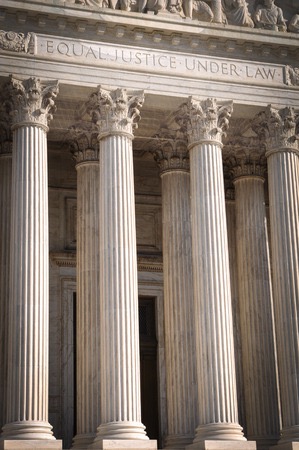 Earlier today the U.S. Supreme Court issued an opinion in Impression Products, Inc. v. Lexmark International, Inc. In an opinion authored by Chief Justice John Roberts, and joined by all members of the Court except Justice Ginsburg (concurring in part and dissenting in part) and Justice Gorsuch (who took no part in the case), the Supreme Court determined that when a patent owner sells a product the sale exhausts all patent rights in the item being sold regardless of any restrictions the patentee attempts to impose on the location of the sale. In other words, a sale of a patented product exhausts rights — both domestic and international.
Earlier today the U.S. Supreme Court issued an opinion in Impression Products, Inc. v. Lexmark International, Inc. In an opinion authored by Chief Justice John Roberts, and joined by all members of the Court except Justice Ginsburg (concurring in part and dissenting in part) and Justice Gorsuch (who took no part in the case), the Supreme Court determined that when a patent owner sells a product the sale exhausts all patent rights in the item being sold regardless of any restrictions the patentee attempts to impose on the location of the sale. In other words, a sale of a patented product exhausts rights — both domestic and international.
For a complete summary of the decision please see: Supreme Court rules Lexmark sales exhausted patent rights domestically and internationally.
While the decision of the Supreme Court on the first issue, relating to domestic patent exhaustion, may not have been a shock given the Court’s 11+ year trend toward restricting the rights of patent owners, the ruling on the second issue relating to international patent exhaustion was at least somewhat surprising.
What follows is the instant analysis of a distinguished panel of industry experts and insiders who offered their first-take reaction to this most recent Supreme Court, and likely very important decision. As mentioned by several of the panel, significant questions arise with respect to pharmaceuticals that are often offered at lower prices abroad.
 Todd Dickinson
Todd Dickinson
Senior Partner, Polsinelli, LLC
For the second time in barely two weeks, the Supreme Court once again overturned a 25- year- old precedent of the CAFC, and further restricted the rights of patent owners. This time, however, it could have more complicated commercial and international trade ramifications.
In Impression Products v. Lexmark, the Court addressed several questions about when domestic and international “exhaustion” and the “first sale doctrine” take precedence in IP law. In about as definitive language as we get from the Court these days: “[P]atent exhaustion is uniform and automatic.”
“We conclude that a patentee’s decision to sell a product exhausts all of its patent rights in that item, regardless of any restrictions the patentee purports to impose or the location of the sale… [R]estrictions and location are irrelevant; what matters is the patentee’s decision to make a sale.”
Why? Because “[p]atent exhaustion reflects the principle that, when an item passes into commerce, is should not be shaded by a legal cloud on title as it moves through the marketplace”, such “legal clouds” presumably being the here-to-fore enforceable patent-related contractual provisions in the sales and other agreements.
As is often the case, several collateral issues arise, especially with respect to the “foreign sales” section of the opinion.
First, given the current Administration’s stated goal of re-negotiating major multi-lateral trade agreements, such NAFTA and TPP, and possibly even recent bi-lateral free trade agreements, could an Administration, sympathetic towards the positions in their brief, nullify the effect of this case by treaty?
Furthermore, will it accelerate further the apparent shift in some quarters from using patent protection to trade secrets, especially given the recently-enacted Defend Trade Secrets Act, which specifically includes the ability in certain circumstances to enforce those rights extraterritorially of the U.S., and even get the Government help you do it?
Also of interest, was the short-shrift the Court gave the Government’s arguments, especially since it had requested their views in the first place. Calling precedent the Government relied on “sparse and inconsistent”, and “little more than ‘long ago’ on its side”, the Court continued to rule that while contract law could govern the first sale, any attempt to regulate it against a third party, such as with a traditional “reservation of rights” provision, would be “allowing patent rights to stick remora-like[1] to that item as it flows through the market, and would violate the principle against restraints on alienation”.
Needless to say, the impact of this case on the ever-greater globalization of sales and manufacture could be profound. As we seem to say each time the Supreme Court rules in IP, stay tuned.
Todd Dickinson is a Senior Partner at Polsinelli, LLC, in Washington, DC, and is the former Under Secretary of Commerce for IP and Director of the U.S. Patent and Trademark Office.
 Stephen Kunin
Stephen Kunin
Partner, Oblon, McClelland, Maier & Neustadt, L.L.P.
Today, the Supreme Court in Impression Products, Inc. v. Lexmark International, Inc., Case No. 15-1189 in a 8-0 decision on disallowance of post-sale restrictions and a 7-1 decision on international patent exhaustion significantly expanded the first sale patent exhaustion doctrine both domestically and internationally. The Court held that a patentee’s decision to sell a product exhausts all of its patent rights in that item, regardless of any restrictions the patentee purports to impose. While the Court stated that clear resale restrictions in contracts between patent owners and their customers are enforceable under contract law, it may be impractical to be able to effectively enforce such contracts. The Court further held, citing Kirtsaeng v. John Wiley & Sons, Inc., 568 U.S. 519, that an authorized sale outside the U.S. exhausts all rights under the Patent Act as well. As a result, restrictions and location are irrelevant for patent exhaustion; what matters is the patentee’s decision to make a sale.
The implications for patent owners particularly those who sell patented products in foreign markets are considerable. This weakening of patent owner rights may result in patent owners seeking to raise prices for goods sold abroad, but for price regulated products such as pharmaceuticals it may not be so easy to do. Thus, patent owners may need to further rely on regulatory authorities to impose restrictions on products regulated by the FDA or other regulatory bodies to prevent importation of patented goods purchased at lower prices in foreign markets. Otherwise, patent owners will have to be very wary of selling large volumes of patented products in foreign markets where the likelihood is that they are being purchased at low costs for resale in the U.S. to compete with the domestic supply chain.
Stephen Kunin serves as an expert witness and consultant on patent policy, practice and procedure. Mr. Kunin served three decades at the USPTO, including 10 years as Deputy Commissioner for Patent Examination Policy.
 Bob Stoll
Bob Stoll
Partner, Drinker Biddle
Today in Impression Products, Inc. v. Lexmark International Inc., the Supreme Court (SC) again upended at least 20 years of practice and again limited the effect of patents.
Simply stated the holding concludes that patentee’s decision to sell a product, internationally or domestically, exhausts all rights in the product.
The Supreme Court noted that there are still remedies under contract law. But a suit for patent infringement would have been much preferred to a suit for breach of contract for most patent owners. Privity issues arise and state jurisdictions are the norm in breach of contracts suits.
And it is the international exhaustion holding that is particularly troubling. Sales abroad act independently from the US patent system and there is no impact from the US patent system on those sales. Yet in this decision, the Supreme Court says that the foreign sale now diminishes patent rights in the US.
All sorts of goods, including life-saving pharmaceuticals, are sold at lower prices in poor nations. This decision will encourage powerful foreign groups to gather products up and send them back to the US to get the higher prices. Or, companies will not be able to lower prices and sell their products in those countries. Both the poor in distant lands and the innovators in the US will suffer.
Robert L. Stoll has more than 30 years of experience in intellectual property prosecution. Bob retired from the USPTO as Commissioner for Patents at the end of 2011 after a distinguished 34-year government career.
 Matt Levy
Matt Levy
Patent Policy & Litigation Consultant
The Lexmark opinion has the potential to be one of the most important patent decisions the Court has issued. The Court has essentially held that patent rights cannot be used to enforce contracts. The proper claim for breach of contract is, perhaps unsurprisingly, breach of contract. The Court also seems to have rejected the idea that patents are intended to provide some sort of additional reward to the patentee (slip op. at 15):
Exhaustion is a separate limit on the patent grant, and does not depend on the patentee receiving some undefined premium for selling the right to access the American market. A purchaser buys an item, not patent rights. And exhaustion is triggered by the patentee’s decision to give that item up and receive whatever fee it decides is appropriate “for the article and the invention which it embodies.”
Business practices in a lot of industries may have to change dramatically as a result. While Lexmark’s restrictions are obviously unique to printer manufacturers, all sorts of industries use post-sale restrictions or licensing restrictions with patent infringement as the threat to enforce those contractual provisions.
Personally, I think this decision is right. But I expect there to be a lot of people upset about it, and a lot of businesses that are going to be rethinking the way they do things.
Matt Levy is the former Patent Counsel at the Computer and Communications Industry Association (CCIA). He is now a consultant on patent policy issues and patent litigation.
 Melissa Brand
Melissa Brand
Director of IP Policy at BIO
The Court’s decision will change decades of established commercial practice essential to the U.S. economy. The Court provided no analysis of whether such sweeping changes are necessary or even beneficial. Instead, relying on theories of property rights articulated in the 17th Century—a time at which our country was burning people for witchcraft—and a superficial similarity to copyright law, the Court upends established practices, opening the floodgates of grey marketed products to the detriment of consumers in less affluent markets.
With respect to the domestic component, the Court’s decision greatly reduces the incentive for patentees to utilize conditional sales. This penalizes manufacturers who sell products at preferential prices to special users who could not otherwise afford the product. For example, manufacturers will have to rethink whether sales for “research use only” to universities at lower cost will continue to be commercially viable. This could make it more difficult for the end products of such research endeavors to be made available to the public.
The consequences of the Court’s ruling on international exhaustion run counter to decades of U.S. trade negotiations and will have countless unintended and unforeseen consequences. By extending U.S. patent law to foreign transactions that have nothing to do with the United States, the Court has called into question thousands of existing contracts between patentees and foreign distributors, many of which will now need to be renegotiated. Further, because regional pricing will now be virtually eliminated, consumers in less affluent markets will be disadvantaged. This will inevitably lead to an increase in grey marketed goods in the U.S. FDA regulations and emphasis on drug safety will currently mitigate the potential harm in the pharmaceutical sector, but other industries with less regulation will be immediately impacted. And it should be noted that, despite the Court’s suggestion to the contrary, this case itself illustrates that contract law will not be an effective alternative: Lexmark was not in privity with Impression Products, and therefore Lexmark could not have sued Impression Products for breach of contract. Lexmark’s recourse would have been to sue the individual consumers who entered into the Return Program contracts with Lexmark. Not only would suing individual consumers be unrealistic and expensive, but the remedies available to Lexmark and the ability of the individual consumers to satisfy judgments against them are unclear.
 Matthew Holohan
Matthew Holohan
Partner, Kilpatrick Townsend
In two key holdings, the Court held that restriction on the sale or use of a patented product after the product is sold cannot be enforced via U.S. patent law, and that non-U.S. sales trigger patent exhaustion. What this means is that post-sale restrictions cannot be enforced in a lawsuit for patent infringement, but could still be enforced in an action for breach of contract. Writing for the Court, Chief Justice Roberts applied very traditional property rights principles to the sale of patented goods. Once a sale is complete, that is, once title is transferred in exchange for compensation, the patentee surrenders all patent rights in the product sold. If a patentee wishes to somehow limit the buyer’s use or resale of the product, the patentee must establish a contract with the buyer independent of the property sale. This surrender of rights applies even if a sale occurs outside the United States, and thus outside the jurisdiction of U.S. patent law. In practical terms, patentees wishing to limit the use or resale of their patented goods will need to come up with creative ways to form contracts with their customers, or even third-parties, that are both economic and enforceable.
Matthew Holohan has extensive litigation and appellate experience. He has represented clients in U.S. district courts, the U.S. International Trade Commission, and before the United States Court of Appeals for the Federal Circuit.
 Michael Hawes
Michael Hawes
Partner, Baker Botts
Today, the Supreme Court endorsed the broader exhaustion of patent rights in two different areas,” said Baker Botts partner Michael Hawes, IP litigator in the firm’s Houston office. “First, the Court held that any sale by of an invention by a patent owner or its licensee exhausts the patent rights in that invention even if the buyer violates clear and enforceable contractual restrictions of that sale. Second, the Court held that sales outside the United States also exhaust patent rights to the same extent as sales in the United States. The ruling particularly hurts inventors who sell reusable products, such as the toner cartridges that were at issue in the case.
Michael Hawes is a intellectual property litigator who handles cases dealing with patent and copyright infringement, trade secret misappropriation, antitrust violations and violation of the IP provisions of employment agreements.
 Michael Risch
Michael Risch
Professor of Law, Villanova University
The heart of this opinion is a distinction between sales and licensing of patented goods. Those who thought that restrictions could be enforced consistent with General Talking Pictures drew no distinction between a license and a “conditional sale.” The Supreme Court, however, found this distinction and made clear: licenses are not exhausted while conditional sales are. Of course, General Talking Pictures was about a license to make, and the Court seems to imply that a license to use is no different than a sale.
What remains to be seen is how industry (and the courts) will react to this distinction. Can Lexmark just change its contract terms to a license, so that customers do not buy the cartridges? Must it “license” directly to customers or may it license distributors to license retailers to license customers? May it only license for manufacture and any further distribution of cartridges can never be limited? Can one ever have a true lease of a patent product that leads to patent infringement for misuse (e.g. use outside of a specific region)? The answer to these questions will have far-reaching effects, not just on patented products but potentially on software licensing as well.
Professor Risch’s teaching and scholarship focus on intellectual property and internet law, with an emphasis on patents, trade secrets and information access.
 Case Collard
Case Collard
Dorsey & Whitney
Lexmark pushes its patent rights to the limit. It tried to restrict the use or resale of patented products after they have already been sold. Imagine if you could not resell the patented iPhone that you purchased because Apple continued to enforce its patent rights after it sold the product. This is what Lexmark tried to do with its printer cartridges. They did not want the defendant, Impression Product, Inc., to refurbish and resell patented Lexmark ink cartridges. But the Supreme Court held today that Lexmark pushed the patent law too far.
The Supreme Court found that Lexmark exhausted its patent rights under the “first sale” doctrine. The first sale doctrine states that a patented produce is sold, the purchaser may do what they please with the product. The Supreme Court confirmed it applies to sales made in the US and abroad. If a patent-holder like Lexmark wants to limit the rights of a purchaser, perhaps they can do so under contract law, but once they have made a sale, they can no longer bring an action under the patents statutes. Companies like Lexmark—that try to maintain control of a product after sale—may have to adjust their business models, but frankly, that is a relatively niche group, so it is unlikely to be a sweeping change on patent holders.
Case Collard is a partner at the international law firm Dorsey & Whitney who focuses on intellectual property disputes and developing strategies for safeguarding intellectual property rights.
 Robert Gerstein
Robert Gerstein
Partner at Marshall, Gerstein & Borun LLP
There was little doubt that the Supreme Court would rule for Impression Products on both major issues, finding that a sale of product by a patent owner prevents the patent owner from using patent law to: enforce restrictions it placed on use of that product; or prevent import of that product into the US when the sale was made abroad. The lower court had relied on its own precedent in the face of Supreme Court cases that, while not exactly on point, were close enough to indicate that a reversal was highly likely.
The real question was how much leeway the Court would leave companies to achieve some of these goals by other means? While it is clear that some types of restrictions will now be impossible to achieve, the Supreme Court appears to have left open the possibility of using complex business structures, including licensing and even transferring patents to related parties, as a way to limit the effect of the decision. Case law in the coming years will have to sort out which strategies will actually have their desired effect. It is also important to note that Impression Products only limits the use of patent law to achieve those goals, so most companies will be taking a hard look at their agreements with customers and distributors, particularly those outside the US, if they want to limit use or importation of their products.
Another interesting question is how this case might drive changes in the healthcare industry. Manufacturers of prescription medication often sell their products at higher prices in the US than in other countries, using both patent law and a statutory restriction on importing prescription drugs, even where those drugs were made in the US. With the Impression Products decision undercutting patent law as a tool to prevent re-importation and President Trump and others criticizing the high cost of medication in the US, it is possible that there will be a movement to loosen the other statutory restrictions in this area in an attempt to lower US drug prices.
Mr. Gerstein has been selected as one of the “World’s Leading Patent Practitioners” from 2012-2016 and as one of the “World’s Leading Intellectual Property Strategists” for several years by Intellectual Asset Management (IAM) magazine.
 John DiMatteo
John DiMatteo
Partner at Holwell Shuster & Goldberg LLP
The Supreme Court has once again changed a previously understood area of patent law—here, the right to limit a sale of a patented item to a single use and to preclude the importation of sales made abroad—and thrown it out the window. Patent exhaustion, also known as the first sale doctrine, is now a powerful defense with the potential to shake up not only the replacement cartridge business, but medical device and pharmaceutical businesses too. Patent owners will now need to sharpen their sales contract clauses knowing that they will only have contract law to protect resales and the importation of goods sold abroad.
John DiMatteo tries patent matters before federal courts and the International Trade Commission. He also handles Inter Partes Reviews (IPRs) and related complex U.S. Patent Office proceedings.
 Ronald Schutz
Ronald Schutz
Partner at Robins Kaplan LLP
Today the Supreme Court again reversed the Federal Circuit’s holding that once an item is sold either in the United States or abroad all patent rights are exhausted. The winners from today’s decision are those companies that repurpose or reuse items that are covered by patents, such as the printer cartridges at issue in the case. Although the Court left open the possibility that patent holders could attempt to impose post-sale restrictions through contracts, this will be a very difficult thing to do in the consumer products arena.
This decision will certainly open up new business opportunities. One area sure to see an increase is the re-importation into the US of goods sold overseas where there is a price differential between the price of the product in the US and the price of the product in the foreign country.
Ronald J. Schutz is the Chair of the Robins Kaplan National IP and Technology Litigation Group, Managing Partner of the New York office, and a member of the firm’s Executive Board.
 Brian Kacedon
Brian Kacedon
Partner, Finnegan Henderson
The decision today from the Supreme Court in Impression Products, Inc. v. Lexmark International, Inc., while not wholly unexpected, places some real limitations on a patent holder’s ability to control the use of a patented product after it is sold. In rejecting the enforceability of post-sale restrictions under the patent laws, the Court has effectively limited a patent holder to using the tools available under state contract law to impose restrictions on its customers. In some cases, however, those tools will not be up to the task. Often, imposing contractual conditions throughout the stream of commerce will be difficult, if not impossible. And even if one can impose such conditions, it will often be impractical to actually sue these customers for any breach of those conditions. As a result, companies may need to rethink the manner and the terms on which their products are sold. On the other hand, in reaffirming where patent rights must, as the Court put it, “yield to the common law principle against restraints on alienation,” the Court has removed a potential burden on consumers who might be purchasing products subject to conditions of which they are unaware.
Similarly, in holding that U.S. patent rights can be exhausted by sales outside the U.S., the Court also restricted a patent owner’s ability to set different terms of sale in different countries. In particular, the ability to price products differently based on the territory in which they are sold becomes substantially more difficult as one may now more easily purchase a product at a lower price outside the U.S. and bring it into the U.S. for resale. Again, this is likely to cause some companies to reconsider how they sell their products and on what terms. In some cases, companies may reconsider whether to sell in certain territories at all if they cannot command a high enough price. On the other hand, as the Court noted, the patent laws do not guarantee the patent holder a right to price discriminate. In this way, the ruling may prove beneficial to consumers in some circumstances. So, overall, while the decision of the Court is clear, dealing with the impact of the decision, for at least some patent holders, will be much less so.
Brian Kacedon’s practice focuses on patent and technology licensing and litigation. He has also assisted several leading technology companies in negotiating and drafting licenses for wireless technologies.
 Baldassare Vinti
Baldassare Vinti
Partner, Proskauer
The Supreme Court dealt another blow to patentees by holding that the exhaustion doctrine is not a “default rule” which may opted out of by expressly limiting the purchaser’s rights. However, all is not lost for patentees looking to enforce resale restrictions as the Court left open the option of enforcement by breach of contract action under state law.
With respect to international sales, the Supreme Court held that an authorized sale outside the United States, just as one domestically, exhausts all rights under the Patent Act. Patent exhaustion stems from the common law principle against restraints on alienation, and the Court held that nothing in the Patent Act shows that Congress intended to confine that principle to domestic sales.
Baldo’s practice focuses on litigating patent, false advertising, trade secret, trademark and contractual matters in federal and state courts and before the International Trade Commission.
 W. Edward Ramage
W. Edward Ramage
Shareholder, Baker Donelson
The Supreme Court has just told businesses that they get one bite at the apple under patent law, and need to receive whatever compensation they want for the sale of a patented product with the initial sale. While enforcement of post-sale restrictions under contract law remains a possibility, such a course of action is unlikely to be cost-effective, or to reach business competitors that are not parties to the contract. The initial response may be the elimination of offerings like Lexmark’s “Return Program,” which can lead to higher prices across the board. Alternatively, as patent exhaustion is based on the sale of a product, businesses may look at changing their business model from sales to the licensing of a good or service, although this will not work in all cases.
W. Edward Ramage is a patent attorney concentrating his practice in the areas of patent and intellectual property law and litigation, including the protection and management of intellectual property asset portfolios.
_______________
[1] A “remora” is a suckerfish which attaches itself to larger fish or whales, and, while often mutally-beneficial, is apparently hard to dislodge. In slang, it can also refer to the sycophantic entourage, e.g. as to a celebrity.

![[IPWatchdog Logo]](https://ipwatchdog.com/wp-content/themes/IPWatchdog%20-%202023/assets/images/temp/logo-small@2x.png)

![[Advertisement]](https://ipwatchdog.com/wp-content/uploads/2024/04/UnitedLex-May-2-2024-sidebar-700x500-1.jpg)
![[Advertisement]](https://ipwatchdog.com/wp-content/uploads/2024/04/Artificial-Intelligence-2024-REPLAY-sidebar-700x500-corrected.jpg)
![[Advertisement]](https://ipwatchdog.com/wp-content/uploads/2024/04/Patent-Litigation-Masters-2024-sidebar-700x500-1.jpg)

![[Advertisement]](https://ipwatchdog.com/wp-content/uploads/2021/12/WEBINAR-336-x-280-px.png)
![[Advertisement]](https://ipwatchdog.com/wp-content/uploads/2021/12/2021-Patent-Practice-on-Demand-recorded-Feb-2021-336-x-280.jpg)
![[Advertisement]](https://ipwatchdog.com/wp-content/uploads/2021/12/Ad-4-The-Invent-Patent-System™.png)






Join the Discussion
29 comments so far.
Dee
September 3, 2017 05:32 pmDoes this mean that if someone buys a Mickey Mouse cake pan or cookie cutter in the US, that they can then make Mickey Mouse cakes and cookies to sell, and not be guilty of copyright infringement? Does the purchase of a cake pan or cookie cutter give the purchaser permission to use that item to make a profit? This is an ongoing discussion in a cake decorating group and I’m trying to clear up some confusion.
Chuck Lantz
July 6, 2017 05:38 pmI stumbled onto this page while seeking a simple explanation about the Lexmark ruling. While reading the opinions of the legal experts at the bottom of the article, and still a bit confused about the crux of the issue, I saw the photo of Case Collard. I foolishly assumed that he was far too young to offer anything worthwhile. I sit corrected. Mr. Collard’s concise explanation and example was exactly what I needed to get the drift of this case.
Thanks, Case Collard, for helping me out, and for reminding me to stop judging books by covers.
Ash
June 25, 2017 05:57 pmDo you think the result would have been different if there was no patent in the country of first sale? i.e. would there be no exhaustion as there was no patent rights to ‘exhaust’.
Anon
June 3, 2017 09:04 amGreg,
Your “plea” to the masses is noted. As is your omission of the rest of the statement, notably how what you are accusing me of in your attempt to deflect are actions that you yourself engage in.
Thus, your deflection is yet another logical fallacy.
You were the one that brought up “college formal logic” under which your own statements whither.
As it is, your latest attempt here omits a critical item, and you seek to insert a different rationale in its place, and you still seek to “make a bumper sticker” out of the term by not giving that term its full – and consistent – due.
The critical omission is that exhaustion simply does NOT have a tie to where a sale occurs. If there be more risk in a sale in one area, the seller STILL has every power to set his own prices to his liking. There is no judicial mandate that forces the seller to set his price other than at the price the seller chooses to.
What you are really complaining about (but have not been direct on the point), is that you want the seller to be able to control the secondary market. Something that exhaustion – in its direct, plain, and consistent meaning does not allow the seller to do.
You keep on trying to split exhaustion into inconsistent pieces.
I am not impressed.
That you may “want” to do so, and even if you may have some reasons why you “want” to do so, STILL does not address the fact that you are trying to invoke an inconsistent meaning to exhaustion, and you STILL have not addressed that what you want is in fact double dipping and what you want is the control of secondary markets that naturally arise once the seller choose to sell at the price that the seller chooses to sell at.
These are points that you need to recognize, acknowledge, and then address.
You want to talk about “credibility”…?
Start with what you yourself control and start addressing points put to you.
Greg DeLassus
June 2, 2017 11:25 pm“Stop deflecting. Comments about you (and your actions) are on point, just as comments on the arguments are on point.”
I leave it to the dispassionate reader to say whether this sort of thing bolsters or diminishes the author’s credibility.
Greg DeLassus
June 2, 2017 11:20 pm“[W]ith the comment of ‘This is fair enough as far as it goes’… you dismiss the very takeaway of the point: there is NO reliance on location of sale in the concept of benefit of the bargain – and… ‘reduce to bumper-sticker slogans’…”
This is a fair point. Please allow me to address it.
The problem with the benefit-of-the-bargain argument is that—while it is unassailably true—it does not actually establish any meaningful conclusion. Under an international exhaustion rule it is true, as you say, that a seller receives the benefit of his bargain. On the other hand, this is also true under a domestic exhaustion rule. What we are really arguing about is the background rules against which a bargain is struck, not the fairness of any given bargain struck against the backdrop of one rule or the other. Therefore, constantly reprising the refrain “benefit of the bargain” does not get us any closer to deciding which is the better rule.
There was no binding precedent on this point, so the SCotUS could not decide the case on a dispassionate analysis of “this is the law,” or “this is how it has always been.” Indeed, if they had wanted to decide the case on that basis, they would have had to hold for domestic exhaustion, because that rule at least had circuit precedent behind it. International exhaustion had (prior to Tuesday) *no* common-law authority behind it, either in this country or in our common-law sister jurisdictions.
Rather, the only non-arbitrary basis on which to decide the case is policy. What are the policy advantages of domestic exhaustion? Domestic exhaustion (as you evidently grow tired of hearing me repeat) allows a patented to maximize profits on its patented product. The ability to maximize profits is, of course, precisely the aspect of patents that makes them a spur to R&D. If you decrease the capacity of patents to maximize profits, you sap the incentive that patents provide.
What are the advantages of international exhaustion. At the risk of seeming flippant, I do not believe that there are any advantages in the U.S. I can expand on that point if you like, but I feel fairly certain that you disagree with the assertion, so it is probably more efficient for me to let you list what you believe to be the domestic policy advantages of international exhaustion before I attempt preemptively to rebut them.
Anon
June 2, 2017 07:11 pm..and with that, please, Greg, provide some (any) legal position for an inconsistent application of the “benefit of the bargain” // exhaustion doctrine that you want to be taken as a default.
You STILL want to allow a double dipping as some type of “normal.”
It is not.
Anon
June 2, 2017 07:08 pmGreg,
Stop deflecting. Comments about you (and your actions) are on point, just as comments on the arguments are on point.
Calling my response a “personal attack” is a fallacy. There is NO personal attack. I did not say that you were a “bad person.” The comments that I made are directed to your actions during this discussion, and are not ad hominem.
Further, to a certain degree, my indications of your personal actions reflect the very things that you have accused me of (for example, “assume the conclusion”). It is rather poor form to complain of that which you yourself started. And yes, by the way, you are once again assuming the conclusion with the “apply within our borders,” as you neglect the fact (not premise, not conclusion, but fact) of the case before us that the foreign aspects DID impact OUR stream of commerce.
Finally, Your reply is both too far and not far enough.
You go “not far enough” with the comment of “This is fair enough as far as it goes” as you dismiss the very takeaway of the point: there is NO reliance on location of sale in the concept of benefit of the bargain – and if you want to claim “reduce to bumper-sticker slogans” it is YOUR own treatment that is doing the reducing.
You have done this several times now when your argument comes up short.
You go too far with “allows a seller to set prices so as to maximize profits.” This shows an allegiance to a business model, ungrounded in the legal doctrines at the heart of the discussion. There is NO tether to any legal notion that supports an unbridled “must maximize profits” and such is NOT the *whole point* of patents – no matter how many times YOU try to put that on a bumper sticker. That is NOT the Quid pro Quo. And your “logic” trying to tie any type of lack of restraint to being some type of denial of logic for patents in the first place is also a fallacy. It is simply not as you attempt to paint as some type of “uncomfortableness” with profit maximization, and at this point you have truly left the sphere of actually talking about the topic, because you have forgotten (perhaps in your hurry to label it as a bumper sticker slogan and not pay attention to the legal foundation) just what the benefit of the bargain is and the FACT that it has been met in the discussion of the topic at hand.
Greg DeLassus
June 2, 2017 03:33 pm“The benefit of the bargain is the rationale for exhaustion, Nowhere in that premise is the notion of ‘where the sale occurs.'”
This is fair enough as far as it goes. It is certainly true that the SCotUS has traditionally predicated exhaustion on the idea that the seller has received a just reward, and cannot demand more.
Of course, the SCotUS has also traditionally considered that our laws apply only within our borders, and that acts that take place outside our borders ought not to implicate our laws.
To my mind, the best arguments for domestic (but not international exhaustion) to not reduce to bumper-sticker slogans (“benefit of the bargain!”). The reason why domestic exhaustion is the better rule is because domestic exhaustion allows a seller to set prices so as to maximize profits. The ability to set prices so as to maximize profits is the *whole point* of patents. That is the “quo” that the patentee receives in exchange for the disclosure “quid.” If one is uncomfortable with allowing a seller to set prices so as to maximize profits, then one is uncomfortable not only with domestic exhaustion, but with the logic on which patents are founded.
Greg DeLassus
June 2, 2017 03:25 pmDo you notice how very much of your #19 is given to talking about *me*, and how little is given to talking about my *argument*? It is never a good sign for the sanity of an argument when the one defending a proposition must resort to personal attacks against the interlocutor, instead of addressing the merits of the argument.
Anon
June 2, 2017 03:21 pmGreg,
Perhaps you can do the same with any “argument” as to why exhaustion should not be consistent across sales (in other words, regardless of where the sale occurs).
You yourself have provided a premise (or is it a conclusion?) that the benefit of the bargain is the rationale for exhaustion, Nowhere in that premise is the notion of “where the sale occurs.” The underlying issue instead is “did the seller obtain the benefit of the bargain?”
As to your other replies, you insert that I must *assume* that the Supreme Court got Lexmark correct.
First, this is not an assumption that I either make, nor is it required.
Second, you yourself have fallen back to the “logic” that the Supreme Court is deemed to have gotten things correct – albeit not in the present discussion thread, but elsewhere – (I do not so depend on that line of thinking – but you do). This is yet another instance of you being inconsistent, and turning around and accusing me of being inconsistent.
Further yet, you merely claim “circular” for my reasoning when it is not “circular” but merely consistent. You insert “because the case tells us so” as if that is in any way what I stated.
It is not.
The fact of the matter – per the case – was that the US stream of commerce WAS affected by the actions of the parties in the case.
This is a purely factual observation – not any part of a “premise” or “conclusion” and certainly not “circular.”
Your “Argentina” counter example is every bit as circular as you are attempting to label my argument.
As much as you want to accuse me of *assuming* that the Court here was correct, you are assuming that the Court here was incorrect.
I look for any other reasoning from you as to why a situation not consistent in the application of the “benefit of the bargain” relates to exhaustion, and quite frankly, you have been entirely silent as to ANY type of legal foundation for an inconsistent application of the concept.
Maybe you can dig through those college formal logic notes of yours and figure out what your “arguments” have been lacking.
Greg DeLassus
June 2, 2017 01:43 pm“Since… exhaustion principles are not limited to the US when the notion of ‘benefit of the bargain’…”
Back when I took formal logic in college, we were taught that certain words signal that something is a premise of an argument. “Since” was one of those words. That is to say, merely based on a quick glance at your argument, one can see that “exhaustion principles are not limited to the US” is a premise of your argument. It is also, however, the conclusion you purport to be establishing.
I hope that I need not belabor the reasons why it is problematic to include your conclusion among the premises by which you purport to establish your conclusion. Perhaps you want to rephrase this argument?
Greg DeLassus
June 2, 2017 01:39 pm“Since our notion of stream of commerce does in fact include imports… the very notion of exhaustion applies to our stream… If one wishes to talk about exhaustion and not return (or intersect) with our stream, what then would you be discussing? Not this case and not the impact of this case.”
The reasoning above is entirely circular.
Party 1: This case has reached the correct conclusion.
Party 2: How do we know that?
1: Because releasing the item into the stream of commerce exhausts the patent.
2: How do we know that selling an item in Argentina releases it into the stream of commerce in the U.S.?
1: Because this case tells us so.
Yes, the U.S. “stream of commerce” includes imports, but only imports that are (you know) actually imported. Under Jazz Photo, the goods-sold-in-Argentina could be stopped at the customs post, so they were not really “imports,” but rather merely “attempted imports.”
In order to know whether this case is correctly decided, we have to cast our minds back to the state of affairs on the day before the case was decided. Back on Monday of this week, goods sold in Argentina were not, ipso facto, part of the U.S. “stream of commerce.” U.S. patents could be employed to keep those goods from crossing our border.
You can only meaningfully speak of those Argentine goods being within the U.S. “stream of commerce” if you first *assume* that the Supreme Court got Lexmark correct. But that is as much as to say that you can only get to your conclusion by assuming it at the front end of your argument.
Anon
June 2, 2017 01:15 pmThank you Greg, for the first response that actually attempts to provide a cogent legal position.
However…
Since our notion of stream of commerce does in fact include imports (your touchstone with our stream of commerce), and exhaustion principles are not limited to the US when the notion of “benefit of the bargain” is considered (and again, when that benefit of the bargain intersects with our stream – the very notion of exhaustion applies to our stream and truth be told, all of the comments that I have supplied integrate with our stream). If one wishes to talk about exhaustion and not return (or intersect) with our stream, what then would you be discussing? Not this case and not the impact of this case. As we surely note that such intersections exist, then we must recognize the comments do apply and that there is no “assume the conclusion.”
I will disagree with your assessment that we must be totally insular and turn a totally blind eye to the undenialable fact that indeed the “benefit of the bargain” is achieved in a first dip.
Greg DeLassus
June 2, 2017 12:11 pm“The second dip being able to turn around and for that item already relinquished into the stream of commerce, and for which full recompense has been obtained, you want there not to be exhaustion and you want an additional benefit of patent rights to remain in place.”
You are assuming your conclusion here. U.S. laws are not concerned with a “stream of commerce” outside of our borders. There is only one “stream of commerce” with which U.S. laws are concerned, and that is the “stream of commerce” within our borders. By definition, a product sold in Argentina is not in the “stream of commerce” within the U.S. borders. It must cross our border before it can be inside the only “stream of commerce” with which U.S. law might properly concern itself.
Under the old Jazz Photo standard, the ITC would stop that Argentine product at the border, and it would never enter our “stream of commerce.” Because the idea that the product is somehow in our “stream of commerce” is an essential premise to your argument, the rest of your argument falls accordingly now that this premise is shown to be erroneous.
Anon
June 1, 2017 07:31 amNight Writer,
I see a mirror dialogue “on that other blog” – leastwise, an attempt at a dialogue, given the haphazard result of the editorial controls there.
Perhaps here we can flesh out why you think that international exhaustion places an unfair burden on US patent holders.
I believe that the ball is in your court to explain why you think “double-dipping” should be permitted.
The first dip being that the patent holder chooses to sell an item – at the price he chooses – and thus reaping the benefit of the bargain for that item sold.
The second dip being able to turn around and for that item already relinquished into the stream of commerce, and for which full recompense has been obtained, you want there not to be exhaustion and you want an additional benefit of patent rights to remain in place.
Can you separate out your desired End result (and the benefit in your mind of that result) from the means to that end? You make some unsubstantiated claims to benefits in your hypo that are just not there, and appear to want to subsidize a corporations foreign pricing policies with the End of support for the ability to price lower outside of the country with higher prices internal to the country.
If the choice by the patent holder is to sell (at a price the patent holder decides upon), what logic is there not to hold the patent holder to the natural result of that choice?
James McGee
May 31, 2017 01:14 pm“You are CoA. Competitor CoB. CoB has an advantage selling in Country X over you because your sale now includes an exhaustion right in the US that theirs does not. So, if the market price of product P is lower in Country X (often the case), than in the US, then CoB has an advantage over CoA.”
No, CoB does not have an advantage over CoA. CoB can sell the product and have no patent protection on that item in the USA. CoA can also sell the product and have no patent protection on that item in the USA. There is no advantage either way.
Anon
May 31, 2017 09:24 amValuationguy,
You describe the unsuccessful non-legal attempt already tried in this case.
Might be there better tries?
Sure.
But the exhaustion principles are still in play, and your response all the more indicates why a clamping down on “sales dressed as licenses” needs to be undertaken.
Unconscionable attempts to force contracts (including shrink wrap types that force agreement even before the terms can be understood), while falling outside of the purview of patent law, are still items that are – and should be – regulated.
Valuationguy
May 31, 2017 09:09 amWhat you going to see in response to this decision is that various manufacturers of reusable (re-purposed) products will build in mechanisms to their products which require periodic authentication…just like software licenses….to allow them to get their due cut each time the ‘licensed’ product changes hands. There will be no true SALE…just licenses. Research to help IoT devices maintain/authenticate security within networks can already allow microtransactions to allow device reconfiguration after entering the distribution channels (for example Rambus’s CryptoManager system…..which is being used by Vidity to control the authorized distribution of digital films over the Internet). If manufactures build in a chip which scans the configuration of the system its connected to and requires re-verification/authorization if the configuration changes…they can prevent many of their products from working outside an authorized environment.
Might not help the pharma industry since pills can’t be digitally secured…but maybe it will encourage different packaging & distribution systems which CAN be.
Anon
May 30, 2017 10:57 pmYou are wanting an official subsidy effect for US citizens to pay for corporations to be able to choose to sell in foreign countries?
No thanks.
All that you are doing is that circular assume your conclusion thing again.
Night Writer
May 30, 2017 10:50 pmAnd the oddity is that two companies neither of which have a patent in country X for product P can sell the exact same product, but one product comes with patent exhaustion in the US and one does not.
That is just not right.
Night Writer
May 30, 2017 10:26 pm@7 Anon: What?
The situation: US patent on product P, no patent in Country X.
You are CoA. Competitor CoB. CoB has an advantage selling in Country X over you because your sale now includes an exhaustion right in the US that theirs does not. So, if the market price of product P is lower in Country X (often the case), than in the US, then CoB has an advantage over CoA.
Of course CoA should retain patent rights in the US for products sold in Country X. Why should a sale of a product in a foreign country exhaust US patent rights?
Anon
May 30, 2017 10:17 pmNW,
If you want protection in another country, obtain a patent in that country.
Your “logic” here is faulty and assumes the conclusion that you would need to prove. Put it this way: why SHOULD a US patent protect you when you choosing to sell in another country?
You act as if the choice to sell somehow means that the seller should get the benefit of the bargain that the seller agrees to (on price) AND still retains patent protection.
THAT does not make sense.
And you should realize that all that Ginsburg is doing is trying to shield the socialist type countries from market effects and maintain the US position as the subsidizer for the world.
Night Writer
May 30, 2017 09:35 pmThe odd thing about the foreign sales is whose rights are exhausted? So, we get this odd result. A competitor could produce and sell your product in a market where you don’t have a patent for cheaper than you. Why? Because if you sell it then it could be imported to the US with no fear of patent infringement, but if they sell it you could sue.
Consider how odd that is. And, clearly means that the holding is wrong. You don’t get such strange results when holdings are consistent with reality.
Night Writer
May 30, 2017 09:30 pmForeign sales should not exhaust US patent rights. There is no basis for that holding. Ginsburg for once got a patent case right.
Edward Heller
May 30, 2017 06:40 pmListen, anon, the Supreme Court has long ago spoken on this very issue in Bobbs-Merrill and Straus v. Victor Talking Pictures. I doubt that a chastened Federal Circuit will once again refuse to follow the Supreme Court.
If it looks like a sale, talks like a sale and quacks like a sale ….
In order for the transaction not to be a sale, either consideration must be deferred or paid installments, or the item must be returned (or possession transferred to others), on a given date certain.
Anon
May 30, 2017 06:13 pmMr. Heller,
There is a (remaining) elephant in the room:
Merely calling something a “license” when the item is merely a disguised “sale” needs some serious clean-up and control.
This of course runs parallel to the odious view on restraints to alienation of chattels.
If the “petunia” of a license has the color of a sale, the thorns of a sale and yes, even the scent of a sale, well,
A rose of a sale by any name…
Edward Heller
May 30, 2017 06:03 pmTo those who pretend to be surprised at this decision, it really was inevitable after Quanta, and doubly so, if that is possible, after Kirtsaeng. Many of us all along thought Mallinckrodt was irreconcilable with Univis Lens.
But while that case lasted, it allowed, for example, people to license the sale of motors to disk drive companies and to sue the disk drive companies for infringement when using the motors. Double dipping.
For those of you from the disk drive industry, you know exactly what I am talking about.
Edward Heller
May 30, 2017 05:56 pmOn contract law, the Court said “may” be enforceable.
Contract law is the stuff of the States, and the Supreme Court cannot decide matters of state law and it knows it. Erie RR v. Tomkins.
However, given its major league endorsement of the common law rule against restraints on the use or sale of a chattel after sale, citing Coke to the effect that such restraints are void, I am sure most State Supreme Courts are going to be very careful about whether contracts imposing such restraints are enforceable under contract law.
Nevertheless, since sellers want to enforce against third parties to the contract anyway, the issue may never actually be litigated. But in the appropriate case, the result in favor of enforcement is not a foregone conclusion.